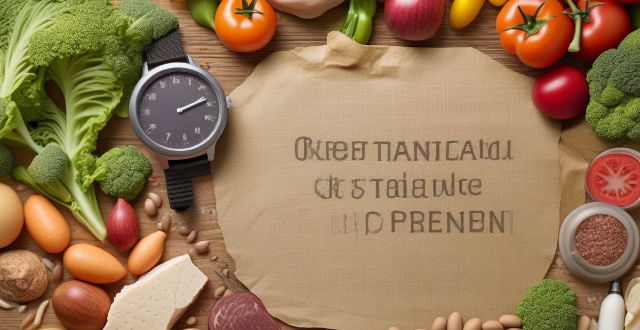This topic discusses the essential nutrients to watch on a vegetarian diet and provides tips for meal planning. It highlights key nutrients such as protein, iron, vitamin B12, calcium, vitamin D, and omega-3 fatty acids and suggests food sources for each. The text also emphasizes the importance of diversifying intake, considering supplementation, having regular check-ups, and working with a professional to create a balanced meal plan. Overall, it offers guidance on ensuring adequate nutrient intake while following a vegetarian diet.

How to Ensure Adequate Nutrients on a Vegetarian Diet
Overview
Adopting a vegetarian diet can be a healthy choice, but it's essential to ensure that you are getting enough nutrients. Here's how to do it:
Key Nutrients to Watch
Protein
- Legumes and Beans: Rich sources include lentils, chickpeas, kidney beans, and black beans.
- Whole Grains: Quinoa, buckwheat, and whole grain bread are good options.
- Nuts and Seeds: Almonds, cashews, pumpkin seeds, and chia seeds are excellent choices.
- Tofu and Tempeh: These are plant-based proteins derived from soybeans.
Iron
- Dark Leafy Greens: Spinach and kale are high in iron.
- Fortified Cereals: Look for breakfast cereals that have been enriched with iron.
- Dried Fruits: Raisins and apricots are good sources.
- Nuts and Seeds: Pumpkin seeds and cashews contain iron.
Vitamin B12
- Supplements or Fortified Foods: This vitamin is only found naturally in animal products, so consider taking a supplement or eating fortified foods like plant milks and nutritional yeast.
Calcium
- Calcium-Rich Plant Foods: Broccoli, bok choy, and calcium-set tofu are good sources.
- Fortified Plant Milks: Many plant-based milk alternatives are fortified with calcium.
- Algae-Based Supplements: Some supplements use marine algae as a source of calcium.
Vitamin D
- Sunlight: Your body can produce vitamin D when exposed to sunlight.
- Fortified Foods: Some plant milks, juices, and cereals are fortified with vitamin D.
- Mushrooms: Certain types of mushrooms are sources of vitamin D, especially if they've been exposed to UV light.
Omega-3 Fatty Acids
- Flaxseeds and Chia Seeds: These are rich in alpha-linolenic acid (ALA), a plant-based omega-3.
- Hemp Seeds: Another good source of ALA.
- Walnuts: High in omega-3s and great for snacking.
- Algal Oil Supplements: For those concerned about getting enough EPA and DHA, which are primarily found in seafood.
Meal Planning Tips
Diversify Your Intake
- Aim for a variety of foods to cover a wide range of nutrients.
- Include different types of legumes, grains, nuts, seeds, fruits, and vegetables in your diet.
Consider Supplementation
- It might be necessary to supplement certain nutrients that are hard to obtain in sufficient quantities on a vegetarian diet, such as vitamin B12, vitamin D, and omega-3 fatty acids.
Regular Check-Ups
- Have regular medical check-ups to monitor nutrient levels in your blood, particularly vitamin B12, iron, and vitamin D.
Work with a Professional
- A registered dietitian can help you create a balanced meal plan tailored to your individual needs.
By following these guidelines, you can ensure that your vegetarian diet provides all the necessary nutrients for a healthy lifestyle.